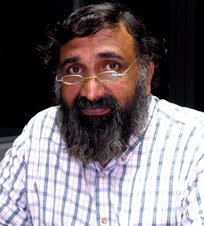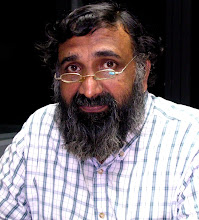The last two days we have been relatively free, though we were not idle. Yesterday, we went to a local organisation that was promoting OLPC in Paraguay. Their office was located in a rather posh house in an expensive locality. We met some young guys there who spoke good English and were apparently trained in Boston. One of them told us that he had been on IRC with Sayamindu Dasgupta just before we reached and apparently Sayamindu told him that I was in the country. Sayamindu was to join the group in Boston soon.
They talked about promoting OLPC here and evolving methods of using the machine to teach. They were also talking about Free hardware. As the discussions dragged on, it was getting to be time for lunch and all of us went to a restaurant. But we were supposed to go for a meeting on MMSL (the organisation that conducted the conference) at 2 pm and we quickly left, with the OLPC guys still enjoying their food. On the way, Juan and Lucho expressed their displeasure with the group because they appeared to be first world guys approaching the problem with a typical first world approach. Juan thought they were kind of undesirable and Lucho seemed to agree. Juan said that if this was how OLPC was being promoted here, we needed to push for another computer taking its place.
At the venue of the MMSL meeting, we found Nicolas (Cabellero and Pereira) and a new person who was to be the Director of Free Software for the Ministry of Education, Oswaldo Daniel Cruz Ramirez. Later, Gladys Canese, the President of MMSL, joined us. Nicolas Caballero introduced us to Oswaldo, who would be one of the people who would be coming to Kerala. He outlined the ideas the Ministry is pursuing and left us to discuss things with Oswaldo. Before a serious discussion could happen, Nicolas left us because he had some important and urgent work to finish. While we were discussing Oswaldo coming to Kerala and how he can prepare himself for the visit, Nicolas came again to introduce a journalist who had come to interview me.
The journalist, who turned out to be from Uruguay (Juan's country) was fluent with only Spanish and Juan had to interpret. There is nothing much to write about the interview because he asked only the usual questions and we all thought that he did a poor interview. After he left, I sat with Oswaldo and talked a few things about what he can read to prepare himself for coming to Kerala. I gave him my card and told him to send me a mail so that I could send him some links that would be useful. Nicolas and others were going to the Congress to present a proposal for digital television that can also help in education, and invited us to join. I declined though Juan was inclined to go, and we all came back home.
At home, I lay down and fell asleep. I was woken up by noises and was told that there were a couple of journalists to interview me for an online newspaper. The guy could speak good English, so it was much easier. He asked me a couple of good questions apart from the routine ones. He asked me whether I though that Free Software would become popular when there were so many proprietary software companies opposing it. I said that I was sure that it was only a question of time before Free Software becomes ubiquitous and he asked me how long I expected that to take. I said, I think, that I could not be sure but it may take maybe two years, maybe five. It was a short interview and he said that it would be published in about two or three days. I felt nervous after the interview because I had been asleep and was afraid that I might have said something that I should not have. But Juan said that I handled it well, and that the man was from a far right newspaper. In such interviews, I am always afraid that they may distort what I say and highlight something that was totally unintended. Hope that doesn't happen.
Today (May 1) we were mostly lazing around but for a visit to a school that teaches children with disabilities along with normal children. We were received by an elderly lady who was, as she said, working with a government school. She decided to start such a school after she retired. She said that she started with children with Down's syndrome but now had no such children in the school. They apparently had children with Dyslexia, Autism and physical handicaps. She said that she had got training for handling such children and she was the first to introduce inclusive education. All over the country, children with such challenges were taught separately. She showed some photographs of children apparently celebrating, but I couldn't see any physically disabled child in them. We couldn't see any special gadgets (wheel chairs, etc) for children with disabilities either. We also met her son and another young person who said they were involved in training and development in Mechatronics. Though I thought that the lady was doing very good work, later we had doubts whether they were really speaking the truth. I suggested that Lucho go there on a working day, if possible, and find out whether there really were physically or mentally challenged children there. I had talked to her about the school in Kolkata where such children were taught along with others, the only such school in India and she wanted to get in touch with them. I promised to send them the contact details. Later, Juan said that they were also apparently looking for money. That made me wonder what their intentions were. But Juan said that we will try to do something for them. I left it at that, hoping that Lucho will go there one day and see what exactly is happening.
The rest of the day was mostly idling and I slept a lot.
Subscribe to:
Post Comments (Atom)


No comments:
Post a Comment